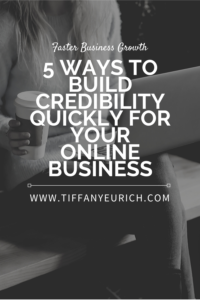5 Ways to Build Credibility Quickly for Your Online Business
You’re finally getting more eyes on your online business, but you need a way to convert lookie-loos to cash-on-the-table buyers… sound familiar?
You may have the greatest product or service in the world, but that doesn’t do you much good if your window shopper doesn’t feel confident in giving you their hard-earned moolah. You need social proof–credibility–to get them to buy in to your brand, and, well… buy.
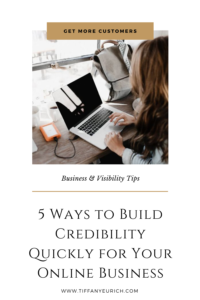
Quick classroom time (there will be a quiz later 😉 ): social proof, a term coined by marketing and psychology professor Robert Cialdini in his 1984 book, Influence, “describes a psychological and social phenomenon wherein people copy the actions of others in an attempt to undertake behavior in a given situation.”
In English? It’s this scenario: You and a friend are in a new city, looking for a great place to eat. Downtown, you find two restaurants side by side.
Eatery A: has a line out the door
Eatery B: has nobody but a forlorn-looking waiter hanging around outside.
Quick: Which one do you pick? Most people will choose option A. Plenty of people waiting to get in means it’s probably pretty good. At least, it’s a safer bet than the option B, where no one else wants to be. In short, option A is lower risk.
Sales in your business work the same way.
In fact, a recent study from the International Journal of Electronic Commerce claims, “social proof has a very strong influence on sales,” and analyzes it as a key factor to the success of none less than Amazon!
So here’s the next question (besides, “is class time over yet?”):
What are some ways you can build credibility–or social proof–quickly?
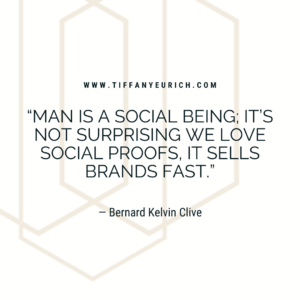
1. Customer testimonials
Share what your product or service has done for your clients, in their own words. One recent study found that displaying reviews can boost conversions 270%, so put a few up where they’ll be seen easily by potential customers. You can screen-capture social posts, encourage brief video testimonials, or pull text and a name from customer surveys. Keep in mind it’s a good idea (and sometimes a legal necessity) to make sure you get permission before posting a testimonial, especially if the client didn’t post it in a public venue.
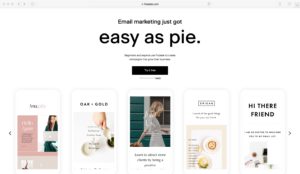
I love the simple way my friends at Flodesk use email images from their happy customers in lieu of testimonials–it shows the product in action. If you want to try them out, that affiliate link will give you 50% off at the time of this posting.
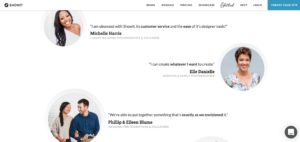
A lovely client testimonial page from Showit, my favorite website platform.
2. Publicity
The fastest way to get credibility–even before you’ve launched your business–is through media mentions, podcast interviews, and press features. Because you can’t go buy press like you can buy an ad (and even seasoned pros don’t get coverage every time they seek it), there’s a sense of exclusivity to publicity. It says, “This business has been vetted by an impartial 3rd party, and found credible.” In fact, one colleague recently found his conversions increased by almost 670% when he started focusing on publicity.
And publicity has a compound effect as well: the more you get, and the more recognized (or harder to earn) it is, the stronger your credibility will appear to potential clients.

Use media spots and endorsements to pack a big punch, very quickly
3. 3rd party awards
Remember when you were little, and someone brought a book to your birthday party that they didn’t know anything about, only that it had a Caldecott or Newbery medal, so it must be good? Yup. Business can work the same way. Awards, like publicity, signal that an uninvested third party has reviewed your work, and thinks highly enough of you to give you their stamp of approval. The very nature of an award or honor sets you apart from your competition and signals that you’re in this for the long haul. If you’ve got some seals, stamps, or medals hanging around, show them off!
4. Connect to big(ger) names
We’ve probably all heard of the “Kate Effect.” It’s what happens when the Duchess of Cambridge, formerly Kate Middleton, wears or buys your brand, and your sales skyrocket. A recent study published in the academic journal, Consumption Markets & Culture, explains that consumers influenced by the Kate Effect often want to live vicariously to those in a different social stratum. That also explains why clothing companies pay for celebrity endorsements and baby brands want their stuff photographed with celebrity kids.
But you don’t have to (and may not want to) get a Hollywood celebrity using your brand to get social proof. Instead, think more about big names in your industry, or the entrepreneurs that are further along and have bigger audiences than you. Being connected to them–through testimonial, media coverage, or shared event appearances–can give your brand that needed little boost in credibility.
5. Consistency in brand voice and content
So this one doesn’t fit the “quick” part of the headline, but it’s a fast way to lose credibility. It doesn’t matter how well connected, reviewed, or covered your brand is, if your messaging is wildly inconsistent. Whether it’s blogs, social media, podcast, YouTube, or email content, stick to a schedule. Find your brand voice and build all your communications elements using it. Whether you’re writing, speaking or being interviewed, keep your messaging consistent, honest, and true to the story you’re telling through your brand, and you’ll see growth.
If you’re ready to get more proactive about telling your brand’s story and gaining credibility through media exposure, we’re here to help. Schedule a discovery call to see how we can work together!
Have a feeling you’ll want to read this again later? Pin it to win it.
